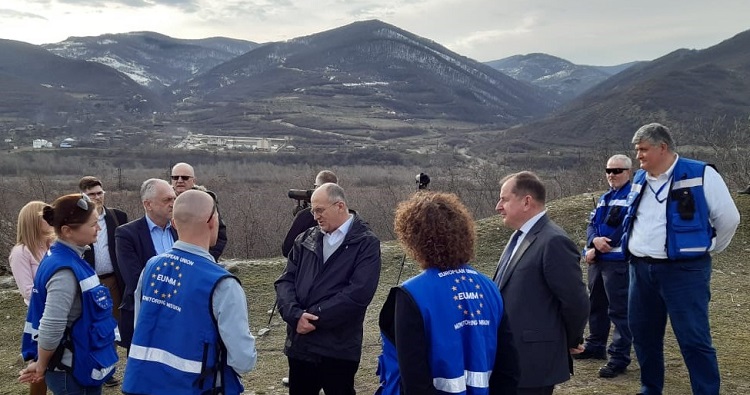OSCE Chairman-in-Office visits Administrative Boundary Line with occupied Tskhinvali

Poland is the fourth biggest contributor to the EUMM, with 18 Polish nationals currently serving in the mission. Photo: EUMM Georgia
Zbigniew Rau, the Chairman-in-Office of the Organisation for Security and Co-operation in Europe (OSCE) and Poland’s Foreign Minister, along with Marek Szczygieł, the Head of the European Union Monitoring Mission (EUMM) in Georgia, visited parts of the Administrative Boundary Line (ABL) with Georgia’s Russian-occupied breakaway Tskhinvali (South Ossetia) region on Wednesday.
During the visit, Szczygieł informed Rau’s delegation about the latest security and humanitarian developments along the ABL and their impact on the daily life of the conflict-affected communities.
The EUMM Mission head pointed out the challenges of the local population, including the access to education, healthcare, property and religious sites.
It was a great honour today to host a ???????? Polish Delegation, led by @OSCE Chairman-in-Office and ???????? MFA @RauZbigniew along the ABL in the Odzisi area. I briefed on the negative impact of ongoing 'borderisation' and closure of crossing points on the daily life of local population. pic.twitter.com/u6QUgenwUz
— Marek Szczygieł (@EUMMGeorgia_HoM) March 30, 2022
Rau thanked the EUMM, as the only international monitoring presence on the ground, for its “continued contribution to stability” throughout Georgia and the wider region.
Poland is the fourth biggest contributor to the EUMM, with 18 Polish nationals currently serving in the mission.
The EUMM is an unarmed civilian monitoring mission deployed in September 2008 following the end of the Russia-Georgia August war. The mission has a valid mandate throughout Georgia, but the de facto authorities of Abkhazia and Tskhinvali have denied them access to the territories under their control.
 Tweet
Tweet  Share
Share